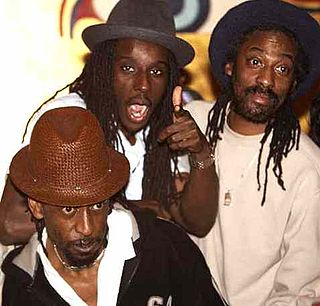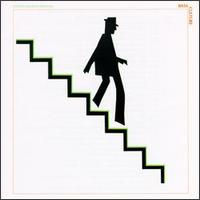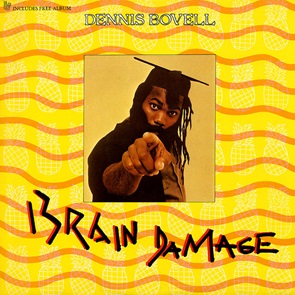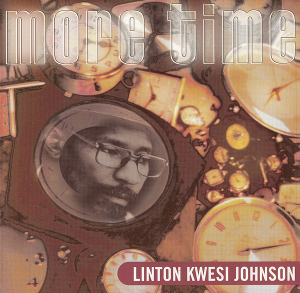
Aswad are a British reggae group, noted for adding strong R&B and soul influences to the reggae sound. They have been performing since the mid-1970s, having released a total of 21 albums. Their UK hit singles include the number one "Don't Turn Around" (1988) and "Shine" (1994). "Aswad" is Arabic for "black". They are three-time Grammy Award nominees.

Jah Shaka, also known as the Zulu Warrior, was a Jamaican reggae/dub sound system operator who operated a South East London-based, roots reggae Jamaican sound system since the early 1970s. His name is an amalgamation of the Rastafarian term for God and that of the Zulu king Shaka Zulu.
Steel Pulse are a roots reggae band from the Handsworth area of Birmingham, England. They originally formed at Handsworth Wood Boys School, and were composed of David Hinds, Basil Gabbidon, and Ronald McQueen (bass); along with Basil's brother Colin briefly on drums and Mykaell Riley. Steel Pulse were the first non-Jamaican act to win the Grammy Award for Best Reggae Album. Collectively the band has won one Grammy award with nine nominations.
Kino Lorber is an international film distribution company based in New York City. Founded in 1977, it was originally known as Kino International until it was acquired by and merged into Lorber HT Digital in 2009. It specializes in art house films, such as documentary films, classic and rarely seen films from earlier periods in the history of cinema, and world cinema. In addition to theatrical distribution, Kino Lorber releases films in the home entertainment market and has its own streaming services for its digital library.
In Jamaican popular culture, a sound system is a group of disc jockeys, engineers and MCs playing ska, rocksteady or reggae music. The sound system is an important part of Jamaican culture and history.
People from the Caribbean have made significant contributions to British Black music for many generations.

Dennis Bovell is a Barbados-born reggae guitarist, bass player and record producer, based in England. He was a member of a progressive rock group called Stonehenge, who later changed name and became the British reggae band Matumbi, and released dub-reggae records under his own name as well as the pseudonym Blackbeard. He is most widely known for his decades-spanning collaborations with Linton Kwesi Johnson.

Brinsley Forde MBE is a British singer and actor of Guyanese parentage who is best known as the founder member of the reggae band Aswad and as a child actor in the children's television series Here Come the Double Deckers! (1970–71).

Bass Culture is an album by the Jamaica-born, British-based dub poet Linton Kwesi Johnson, released in 1980 on the Island Records label. It was produced by Linton Kwesi Johnson and Dennis Bovell. Bovell, Lloyd "Jah Bunny" Donaldson and Webster Johnson were members of Matumbi.
A sound clash is a musical competition where crew members from opposing sound systems pit their skills against each other. Sound clashes take place in a variety of venues, both indoors and outdoors, and primarily feature reggae and dancehall music. The object is to beat or "kill" their competitors.
Trevor Laird is a British actor.
Sir Horace Shango Ové was a Trinidadian-born British filmmaker, photographer, painter and writer based in London, England. One of the leading black independent filmmakers to emerge in Britain in the post-war period, Ové was the first black British filmmaker to direct a feature-length film, Pressure (1976). In its retrospective documentary 100 Years of Cinema, the British Film Institute (BFI) declared: "Horace Ové is undoubtedly a pioneer in Black British history and his work provides a perspective on the Black experience in Britain."

"Sound of da Police" is a song by American rapper KRS-One. Recorded at D&D Studios in New York City with production handled by Showbiz, it was released in December 1993 as the second and final single from KRS-One's debut solo studio album Return of the Boom Bap. It peaked at number 89 on the US Billboard Hot 100.
Lovers rock is a style of reggae music noted for its romantic sound and content. While love songs had been an important part of reggae since the late 1960s, the style was given a greater focus and a name in London in the mid-1970s.

The Mangrove Nine were a group of British Black activists tried for inciting a riot at a 1970 protest against the police targeting of The Mangrove, a Caribbean restaurant in Notting Hill, West London. Their trial lasted 55 days and involved various challenges by the Nine to the legitimacy of the British judicial process. They were all acquitted of the most serious charges and the trial became the first judicial acknowledgement of behaviour motivated by racial hatred within the Metropolitan Police.
Martin Stellman is a British screenwriter and director best known for creating and writing The Interpreter (2005), starring Nicole Kidman and Sean Penn, and co-writing with Franc Roddam the 1979 British cult classic Quadrophenia.
Franco Rosso was an Italian-born film producer and director based in England. He is known for making films about Black British culture, and in particular for the 1980 cult film Babylon, about Black Jamaican youth in south London, which was backed by the National Film Finance Corporation.

Brain Damage is the third studio album by Barbadian-British reggae musician Dennis Bovell, released in 1981 by Fontana Records. His first solo album under his own name, following two dub albums released as Blackbeard, it was Bovell's first recording at his South London-based Studio 80. Having begun to feel that reggae had not progressed as much as he would have liked, he conceived Brain Damage as an attempt to fuse the genre with numerous rhythmic styles from Europe, America, Africa and the Caribbean to highlight the genre's flexibility. The musician intended not to explore the international rhythms in a standard way but to take them to what he perceived as musical extremes. The direction was also inspired by the wide array of people in his audience.
T-Bone Wilson is a Guyanese-British actor, dramatist and poet.

More Time is an album by the Jamaican-British musician Linton Kwesi Johnson. It was released in 1998 through Johnson's LKJ Records. "Liesense fi Kill", about police brutality, was released as a single. Johnson supported the album with an international tour. The lyrics to many songs were reproduced in Johnson's book of poetry Mi Revalueshanary Fren.








